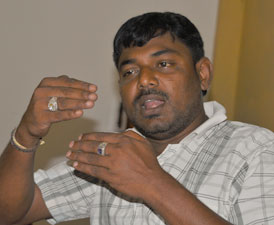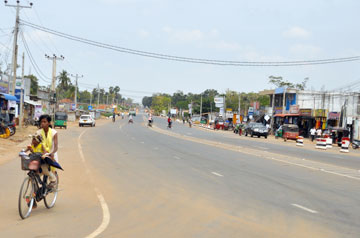|
Shifting demography of Mullaitivu district:
Symbol of a new beginning
By Dhaneshi Yatawara
Nothing of the gloomy past remains anymore in any part of Mullaitivu.
The shifting demography of the Mullaitivu district is a symbol of a new
beginning. Political sentiments are also being expressed by the people.
“People are more concerned about how fast the roads will develop and how
soon schools will be renovated and students will be facilitated with all
the opportunities and that schools will provide suitable accommodation
because there was a time when children had to study under tress as most
of the buildings were destroyed during the LTTE terror period. When
proper infrastructure is provided people are encouraged to work more and
give of their best” said Tharunalingam Nawaneethan, Mullaitivu
Coordinator for the Sri Lanka Freedom Party. Speaking to the Sunday
Observer, Nawaneethan, who is now in active politics for four years said
that the youth in Mullaitivu join officials to work for the betterment
of society.
|

Tharunalingam Nawaneethan |
Following are the excerpts of the interview.
Q : How does the SLFP organization work at ground level?
A: We go to the villages and meet people. We discuss their
problems and inform the relevant authorities about the needs of the
people. If we can solve the problems at party level we do so but we need
to inform officials about problems that need the government mechanism to
bring about a solution.
Q: Mullaitivu is developed compared to a few years ago.
Security, displacement are not the key problems which people face. As a
people’s representative how do you see the current situation?
A: People want to forget the past and continue with their
day-today lives.
People are more concerned about how fast the roads get developed and
how soon schools will be renovated.
|

Bustling Mullaitivu town.
Pix : Thilak Perera |
When proper infrastructure is provided people are encouraged to work
more.
Q: What made you take to full time politics?
A: Professionally I am a businessman. When the people of
Mullaitivu were displaced and were living in the Cheddikulam Welfare
Centres in Vavuniya, I was a resettlement officer and was a Grama
Niladhari on a temporary basis. So I was always with the people and had
many opportunities to help people.
When I returned and resettled in Mullaitivu I had a burning desire to
serve the people. The Government started numerous development projects
in Mullaitivu. I thought by supporting the Government I could be of
immense assistance to the people and it would facilitate my desire to
help them.
I’m working hard to pursue in politics and fulfil my political
ambitions. My determination is to one day represent the people of
Mullaitivu in Parliament. There are enough Ministers and MPs, from the
Government and the Opposition, to assist the Muslim communities in these
areas but there is a minuscule representation as far as the Tamil people
of Mullaitivu are concerned in Parliament from the Government side.
Thus, I hope to fill that vacuum
Q: During the resettling process there were many land disputes
between the people. Lands were taken over by outsiders and original
owners had a problem reclaiming. What is the situation now?
A: This mainly happened in abandoned lands. Over the years
during LTTE control, when some of the displaced people arrived in at
Mullaitivu they cleared abandoned lands and built temporary shelters
which during the course of time turn into permanent homes. There were
several such cases. With the victory over terrorism and the return of
peace after May 2009 original Mullativu residents who have been living
in other parts of the country began returning with their title deeds.
Then the problems with land ownership arose. Then the Divisional
Secretary got involved and solved the problem. Now such problems hardly
exist.
Q: What is the response of the youth towards politics?
A: A significant faction of the youth population is supportive
of political movements. They are not grouped as political parties but as
sports clubs and welfare societies.
We help them to develop their sports skills, to organise tournaments
and such activities.
They join and help us for any work that is for the betterment of
society. |

